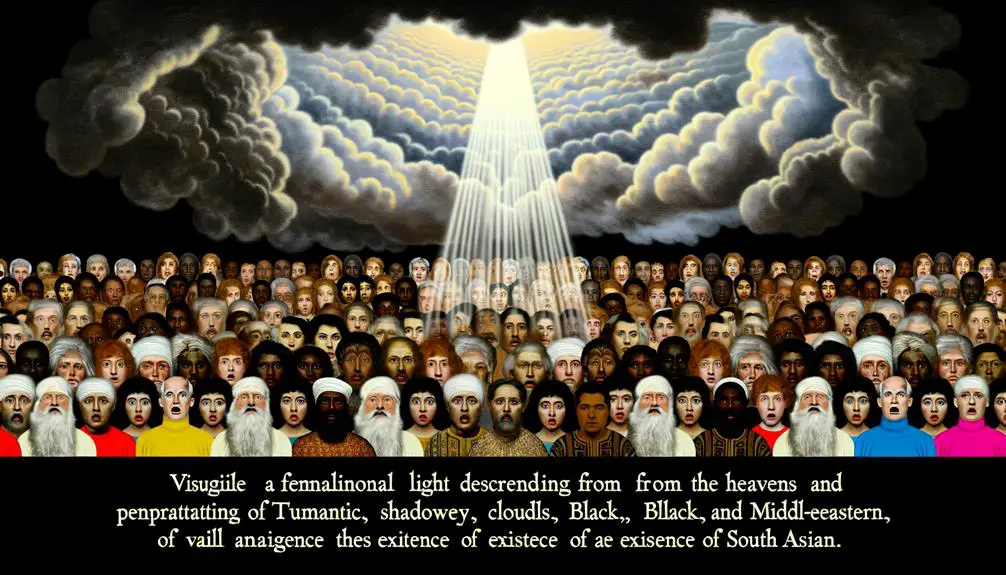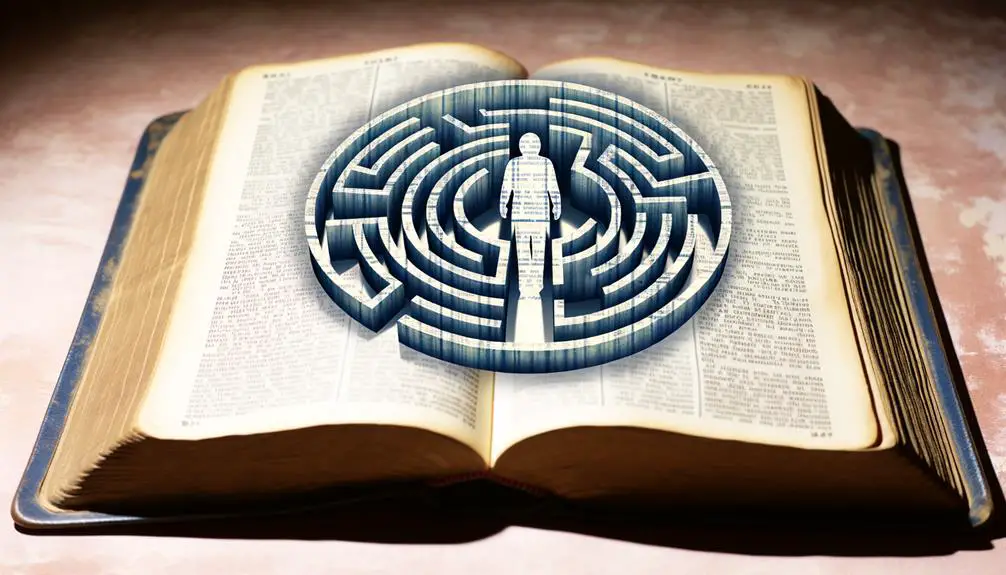Learn how being 'confounded' in the Bible reveals deep spiritual lessons and transformative moments, urging a closer examination of divine narratives.

Meaning of Confounded in the Bible
In the rich tapestry of biblical narratives, characters often find themselves in a bit of a pickle, or as the scripture puts it, 'confounded.' You might wonder what this term, with its roots deep in historical and linguistic contexts, truly means within the sacred texts.
It's not merely about being puzzled or astonished; there's a profound layer of divine intervention, human arrogance, and transformative experiences waiting to be uncovered. By exploring these instances, you'll gain insights into how moments of being confounded signal significant spiritual challenges and growth.
What lies beneath these stories could change your understanding of biblical teachings and their application to modern life.
Key Takeaways
- "Confounded" in the Bible often signifies moments of divine intervention, leading to astonishment and reevaluation of one's understanding of God.
- It reflects a deep interplay between human arrogance and divine will, emphasizing the need for humility to comprehend divine intentions.
- Linguistic roots from Hebrew, Greek, and Aramaic highlight the complexity of translating "confounded," affecting interpretations across different Bible versions.
- Being confounded is portrayed as a transformative experience, guiding individuals towards deeper faith and spiritual insight.
Historical Context of 'Confounded

In exploring the historical context of the term 'confounded' within the Bible, it's essential to recognize how its usage reflects the evolving linguistic and cultural landscapes of ancient societies. The Bible, as a text, didn't exist in isolation but emerged from a milieu deeply entrenched in geopolitical influences and cultural assimilation, which significantly shaped its language and narratives.
You'll find that the term 'confounded' often captures the essence of confusion and disarray, particularly in the face of God's interventions or the failure of human plans against divine will. This isn't merely a matter of linguistic choice but a reflection of the tumultuous times during which the biblical texts were written. The ancient Near East was a tapestry of empires rising and falling, of nations clashing and merging. These geopolitical upheavals had a profound impact on the peoples of the Bible, influencing not just their physical circumstances but their theological reflections and expressions.
Moreover, cultural assimilation played a pivotal role in how concepts were articulated in the biblical texts. As cultures blended and beliefs intermingled, the biblical language absorbed and reflected these shifts. The use of 'confounded' in the Bible, therefore, goes beyond its surface meaning, encapsulating a broader narrative of divine sovereignty amidst human uncertainty and the complex interplay of cultures and faiths.
Understanding 'confounded' within this historical backdrop allows you to appreciate the depth of its usage in the Bible. It's not just a word but a window into the struggles, hopes, and divine encounters of ancient peoples navigating the challenges of their time.
Linguistic Roots and Interpretations

You'll find that understanding the term 'confounded' in the Bible necessitates an exploration of its Hebrew and Greek origins.
These linguistic roots reveal nuanced meanings that have shaped its interpretation across various modern translations.
This variance highlights the complexities involved in accurately conveying ancient texts to contemporary audiences.
Hebrew and Greek Origins
Exploring the Hebrew and Greek origins of 'confounded' unveils a rich tapestry of linguistic roots and interpretations that deepen our understanding of its biblical context. You'll discover that both the Hebrew and Greek languages contribute layers of semantic nuances, underscoring the translation challenges faced by scholars.
Language |
Original Word |
Implications |
|---|---|---|
Hebrew |
בּוּשׁ (bush) |
To be ashamed, confused |
Greek |
συγχέω (syncheo) |
To mix together, disturb |
Aramaic |
מְהוּם (mehum) |
Disturbance, confusion |
This table illustrates how 'confounded' is rendered in different biblical languages, each adding its own shade of meaning. The Hebrew emphasizes shame, the Greek focuses on disturbance, and the Aramaic on confusion, highlighting the rich, complex interplay of language and theology in the Bible.
Modern Translations Variance
Delving into modern translations of the Bible, you notice a fascinating variance in how the term 'confounded' is rendered, reflecting its rich linguistic roots and diverse interpretations. This variance isn't just linguistic; it's deeply tied to translation accuracy and cultural implications.
Each translation seems to navigate the complex terrain between literal accuracy and the need to resonate with contemporary readers, balancing the original context with modern understanding. The choice of words can significantly affect the perceived message, highlighting the translators' interpretative decisions.
Such differences underscore the importance of considering multiple translations for a fuller understanding of biblical texts. They remind you that translation is as much an art as it's a science, shaped by historical, cultural, and linguistic factors.
Instances of Astonishment

The biblical narrative frequently presents moments of astonishment, serving as pivotal points that underscore the profound impact of divine interventions and revelations on human understanding. These instances, often marked by miraculous events and prophetic revelations, aren't merely for dramatic effect. They're intricately woven into the fabric of the biblical message, offering you deep insights into the nature of faith, the power of God, and the potential for transformation within the human heart.
Consider the numerous stories where miraculous events leave witnesses utterly astonished. These aren't just tales of wonder; they're theological signposts. They invite you to ponder the limitless power of God, who intervenes in the natural order in ways that defy human logic and understanding. These moments aren't just for the spectators within the stories; they're for you too, serving as reminders of a God who's actively involved in His creation.
Similarly, prophetic revelations often leave their recipients—and, by extension, you as the reader—in a state of shock and awe. These aren't arbitrary forecasts about the future but are deeply connected to the present reality of the people who receive them. They challenge you to rethink your understanding of God's will, urging a deeper reflection on your part about the direction of your life and the collective journey of humanity.
In essence, instances of astonishment in the Bible aren't just historical footnotes. They're divinely orchestrated moments designed to jolt you out of complacency, compelling you to confront the divine mystery and reconsider your place within it.
Moments of Divine Intervention

Building on the foundation of astonishment, moments of divine intervention further illuminate the dynamic relationship between humanity and the divine, showcasing how these encounters significantly shape the course of human history and individual faith journeys. These miraculous occurrences aren't just random acts; they're carefully orchestrated, revealing the precision of divine timing. You see, these moments aren't just about the spectacle or the awe they inspire; they're deeply personal, transformative experiences that guide, correct, and sometimes radically alter the trajectory of lives and communities.
Analyzing these divine interventions, you'll notice a pattern: they often come at critical junctures, when human efforts have reached their limits, underscoring the notion that divine timing isn't just perfect, it's purposeful. It's in these pivotal moments that you're reminded of the profound interconnectedness of divine will and human experience. Whether it's the parting of the Red Sea, providing manna from heaven, or the countless other examples, each act of divine intervention serves multiple purposes. They're not only immediate solutions but also enduring lessons in faith, obedience, and the power of the divine.
What's particularly insightful is how these moments challenge your understanding of reality, pushing you to expand your perception of what's possible. They invite you to consider a reality where the divine isn't distant or detached, but intimately involved in the fabric of human existence, ready to intervene in the most unexpected and miraculous ways. Through these encounters, you're given a glimpse into the heart of the divine, revealing a profound commitment to engagement, guidance, and, ultimately, a deep, enduring relationship with humanity.
The Role of Human Arrogance

In exploring the dynamics of divine-human interaction, it's crucial to recognize how human arrogance often serves as a pivotal barrier to understanding and embracing the full scope of divine intentions. You see, the Bible is replete with narratives where pride consequences are starkly laid out, and the humility lessons are clear, yet challenging to internalize. This dynamic sheds light on the profound impact of arrogance on one's spiritual journey.
Biblical Figure |
Example of Pride |
Humility Lesson |
|---|---|---|
Pharaoh |
Hardened heart against freeing the Israelites |
Plagues leading to loss and destruction |
Nebuchadnezzar |
Boasted about Babylon's greatness as his achievement |
Stricken to live like an animal until acknowledging divine sovereignty |
Saul |
Disobeyed divine command out of fear and pride |
Kingdom torn away and spiraled into despair |
Through these examples, it's evident that arrogance blinds individuals to the wisdom and guidance offered by the divine. You're confronted with the stark reality that pride not only distances you from divine will but also leads to consequences that can be both personal and far-reaching. The humility lessons here are profound; they teach that recognizing one's limitations and the supremacy of divine intention is fundamental to spiritual enlightenment and growth.
As you delve deeper into the scriptures, it becomes clear that humility is not just a virtue but a necessity for those who seek to align themselves with divine purposes. The path away from arrogance towards humility is challenging but essential for anyone looking to understand the full meaning of being confounded in the biblical sense.
Transformative Experiences

Shifting focus to transformative experiences, it's crucial to understand how moments of profound change play an indispensable role in overcoming arrogance and fostering humility. Such experiences, often marked by inner revelations, challenge your existing beliefs and push you toward personal growth. They serve as milestones that not only redefine your understanding of self but also reshape your interaction with the divine and the world around you.
To paint a picture for the audience, consider the following:
- Moments of vulnerability that lead to an unexpected depth of self-awareness, compelling you to confront your limitations and acknowledge your need for guidance beyond yourself.
- Encounters with the divine that defy logical explanation, leaving you with a profound sense of awe and a humbled spirit, keenly aware of your place in a larger, mysterious plan.
- Life-altering events that strip away layers of pride, revealing the core of your being and prompting a reevaluation of what truly matters.
- The journey from questioning to faith, where doubt serves not as a stumbling block but as a stepping stone to deeper understanding and a more genuine relationship with the divine.
These transformative experiences aren't merely episodes in life but are pivotal points of inner revelation. They mark the passage from one state of being to another, enriching your spiritual journey and enhancing your capacity for empathy, compassion, and genuine humility. In essence, they're the crucibles in which your character is refined, and your understanding of the divine deepens, leading to an enriched, more meaningful existence.
Reevaluating Spiritual Challenges

Reevaluating spiritual challenges invites you to scrutinize the hurdles and adversities you've encountered on your faith journey, recognizing them as catalysts for growth rather than mere obstacles. This process isn't about dismissing your struggles but understanding their role in shaping a more resilient and profound faith. When you face doubts or moments of faith questioning, it's easy to feel confounded or spiritually adrift. However, these instances aren't merely tests of faith; they're opportunities for spiritual growth and deeper understanding.
Delving into the biblical context, the notion of being confounded often relates to moments of confusion and disarray, yet it also opens a pathway to transformative insight. Biblical narratives are replete with examples where figures are initially confounded by their circumstances or divine messages, only to emerge with a refined perspective on their faith and purpose. Thus, reevaluating your spiritual challenges through a biblical lens encourages you to perceive your faith questioning not as a weakness but as a stepping stone to a more nuanced and mature spiritual life.
In this analytical exploration, it's crucial to recognize that spiritual growth is an ongoing process, marked by periods of questioning, learning, and evolving. By facing and reflecting on your spiritual challenges, you're not merely navigating through periods of doubt; you're actively participating in the construction of a more robust and enlightened faith. Consequently, reevaluating these challenges is a vital practice for anyone seeking to deepen their understanding and experience of spiritual life.
Frequently Asked Questions
How Does the Concept of Being Confounded Relate to Modern Psychological Theories on Confusion and Cognitive Dissonance?
When you explore how being confounded relates to modern psychological theories, you're diving into the complex interplay between cognitive flexibility and decision-making processes.
Cognitive dissonance, a key factor here, reveals the tension you experience when holding contradictory beliefs or information.
This dissonance pushes you towards cognitive flexibility, enhancing your decision-making by forcing you to reconcile these conflicts, thereby reducing confusion and improving your ability to adapt and make informed choices.
Are There Any Notable Differences in the Interpretation of Being Confounded Between the Various Translations of the Bible, Such as the King James Version Versus the New International Version?
You'll find notable differences in the interpretation of 'confounded' among Bible translations, like the King James Version versus the New International Version. This variation highlights the challenges of translation accuracy and linguistic evolution.
As languages evolve, so do interpretations, affecting how concepts like confusion are conveyed. Analyzing these versions side by side offers an insightful look into how linguistic shifts shape our understanding of biblical texts through the ages.
How Do Non-Abrahamic Religions or Philosophies Interpret the Notion of Being Confounded or Similar Experiences?
In a tapestry of beliefs, you'll find Hindu Karma weaving tales of actions leading to inevitable consequences, suggesting that being confounded stems from one's own deeds.
Meanwhile, Taoist Harmony portrays a dance between balance and chaos, where confounding experiences are merely steps toward achieving equilibrium.
Both perspectives offer a rich, analytical insight into the universal experience of bewilderment, transcending the specific religious context and inviting a broader, scholarly understanding.
Can the Feeling of Being Confounded Be Seen as a Positive Spiritual or Personal Growth Catalyst Outside of the Biblical Narratives?
Absolutely, feeling confounded can serve as a powerful growth catalyst, pushing you towards personal transformation.
When you're perplexed, you're essentially at a crossroads, challenging your current understanding and beliefs. This confusion forces you to seek new insights, question established norms, and explore different perspectives.
Through this process, you not only gain deeper knowledge but also foster personal growth, making confoundment a critical step in your journey of self-discovery and development.
How Has the Concept of Being Confounded in the Bible Influenced Contemporary Literature, Music, or Art in Ways That Diverge From Its Original Religious Contexts?
You're witnessing a transformation. The concept, once rooted in sacred texts, now permeates contemporary culture. Through cultural assimilation and artistic reinterpretation, it's reshaped literature, music, and art.
This shift isn't just about a word; it's an exploration of human experience, challenging and enriching. Analyzing these divergences offers insights into how ancient narratives continue to influence, evolve, and inspire beyond their original religious contexts, proving their timeless relevance.
Conclusion
In sum, exploring 'confounded' within the Bible reveals a multifaceted concept, intertwining divine intervention, human arrogance, and transformative experiences. Consider the Tower of Babel, a prime example of human pride meeting divine action, resulting in confusion and dispersion. This story encapsulates the essence of being confounded—highlighting not just bewilderment but a profound redirection towards humility and understanding.
It's a reminder that spiritual challenges often serve to refine our perceptions and realign our paths toward a deeper comprehension of the divine.



Sign up